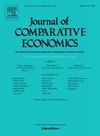Hedging desperation: How kinship networks reduced cannibalism in historical China
IF 2.8
2区 经济学
Q1 ECONOMICS
引用次数: 0
Abstract
Survival cannibalism persisted across human societies until recently. What drove the decline in cannibalism and other forms of violence? Using data from the 1470–1910 period, this paper documents that in historical China, the Confucian clan—an institutionalized kinship network—acted as an informal internal market to facilitate intra-clan resource pooling and risk-sharing, thus reducing the need for cannibalism during times of drought-related famine. The risk mitigation role of the clan remains robust after controlling for economic development and other factors and ruling out alternative channels. Thus, kinship networks and their associated culture contributed to human civilizational development before the advent of formal markets.
对冲绝望:亲属网络如何减少中国历史上的人吃人现象
人类社会中的食人生存现象一直持续到最近。是什么导致了食人和其他形式暴力的减少?本文利用 1470-1910 年间的数据,记录了在中国历史上,儒家宗族--一个制度化的亲属关系网络--作为一个非正式的内部市场,促进了宗族内部的资源汇集和风险分担,从而减少了在干旱饥荒时期的食人需求。在控制了经济发展和其他因素并排除了其他渠道之后,氏族的风险缓解作用仍然很强。因此,在正规市场出现之前,亲属关系网络及其相关文化对人类文明发展做出了贡献。
本文章由计算机程序翻译,如有差异,请以英文原文为准。
求助全文
约1分钟内获得全文
求助全文
来源期刊

Journal of Comparative Economics
ECONOMICS-
CiteScore
4.40
自引率
0.00%
发文量
66
审稿时长
45 days
期刊介绍:
The mission of the Journal of Comparative Economics is to lead the new orientations of research in comparative economics. Before 1989, the core of comparative economics was the comparison of economic systems with in particular the economic analysis of socialism in its different forms. In the last fifteen years, the main focus of interest of comparative economists has been the transition from socialism to capitalism.
 求助内容:
求助内容: 应助结果提醒方式:
应助结果提醒方式:


